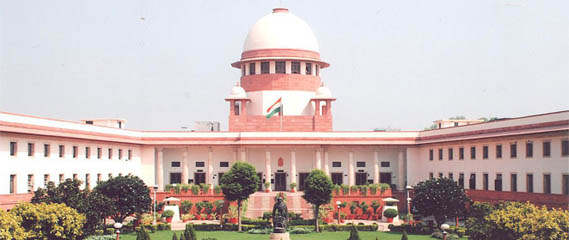| Courts in India |
 |
India has one of the oldest legal systems in the world. Its law and jurisprudence stretches back into the centuries, forming a living tradition which has grown and evolved with the lives of its diverse people. India's commitment to law is created in the Constitution which constituted India into a Sovereign Democratic Republic, containing a federal system with Parliamentary form of Government in the Union and the States, an independent judiciary, guaranteed Fundamental Rights and Directive Principles of State Policy containing objectives which though not enforceable in law are fundamental to the governance of the nation.
India's judicial system is made up of the Supreme Court of India at the national level, for the entire country and the 21 High Courts at the State level. These courts have jurisdiction over a state, a union territory or a group of states and union territories. Below the High Courts are a hierarchy of subordinate courts such as the civil courts, family courts, criminal courts and various other district courts. High Courts are instituted as constitutional courts under Part VI, Chapter V, Article 214 of the Indian Constitution.
The High Courts are the principal civil courts of original jurisdiction in the state along with District Courts which are subordinate to the High courts. However, High courts exercise their original civil and criminal jurisdiction only if the courts subordinate to the High court in the state are not competent (not authorized by law)to try such matters for lack of pecuniary, territorial jurisdiction. High courts may also enjoy original jurisdiction in certain matters if so designated specifically in a state or Federal law. e.g., Company law cases are instituted only in a High court.
However, primarily the work of most High Courts consists of Appeals from lower courts and writ petitions in terms of Article 226 of the Constitution of India. Writ Jurisdiction is also original jurisdiction of High Court. The precise territorial jurisdiction of each High Court varies.
Each state is divided into judicial districts presided over by a 'District and Sessions Judge'. He is known as a District Judge when he presides over a civil case and a Sessions Judge when he presides over a criminal case. He is the highest judicial authority below a High Court judge. Below him, there are courts of civil jurisdiction, known by different names in different states.
Under Article 141 of the Constitution of India all courts in India which includes High courts are bound by the judgments and orders of the Supreme Court of India by precedence.
Judges in a High Court are appointed by the President of India in consultation with the Chief Justice of India and the governor of the state. High Courts are headed by a Chief Justice. The Chief Justices are ranked #14 (in their state) and #17 (outside their state) in the Indian order of precedence. The number of judges in a court is decided by dividing the average institution of main cases during the last five years by the national average, or the average rate of disposal of main cases per judge per year in that High Court, whichever is higher.
The Calcutta High Court is the oldest High Court in the country, established on 2 July 1862. High courts which handle a large number of cases of a particular region, have permanent benches (or a branch of the court) established there. Benches are also present in states which come under the jurisdiction of a court outside its territorial limits. Smaller states with few cases may have circuit benches established. Circuit benches (known as circuit courts in some parts of the world) are temporary courts which hold proceedings for a few selected months in a year. Thus cases built up during this interim period are judged when the circuit court is in session.
|
|
|
| Facts about India |
|
The value of "pi" was first calculated by the Indian Mathematician Budhayana, and he explained the concept of what is known as the Pythagorean Theorem. He discovered this in the 6th century, long before the European mathematicians.[read more]
|
|
| Famous Quotes on India |
|
India is the cradle of the human race, the birthplace of human speech, the mother of history, the grandmother of legend, and the great grand mother of tradition. Our most valuable and most artistic materials in the history of man are treasured up in India only!
|
|
Mark Twain
|
|
Read more quotes
|
|
|
